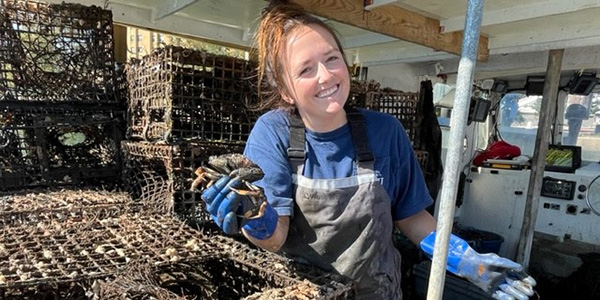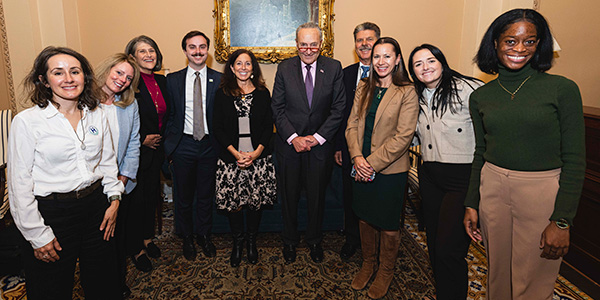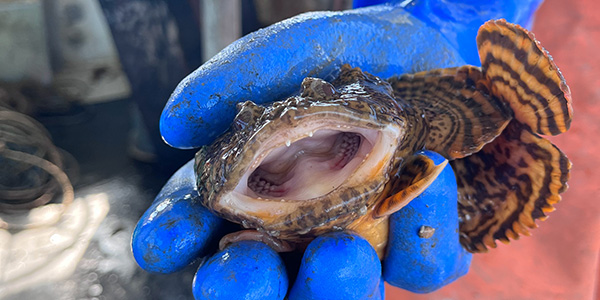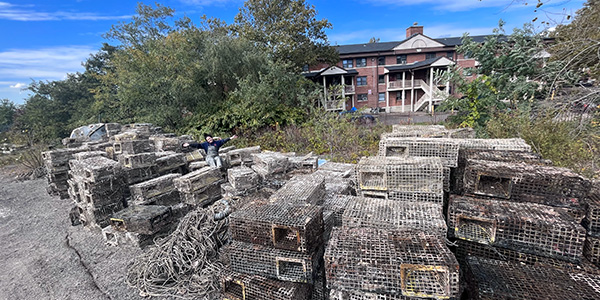
Around a rectangle of tables they sat, members of Congress and their staffs alongside leaders of environmental groups, filling a conference room in the United States Capitol six days before Halloween. And they listened as Emma DeLoughry told them a ghost story.
“I felt like I had everyone’s attention,” said Emma, our Associate Soundkeeper, who spent her three minutes on the agenda last Wednesday weaving for her esteemed audience the unsettling saga of “ghost fishing.”
Emma and the Long Island Sound Study Citizens Advisory Committee had come to D.C. to illuminate for Representatives and Senators from around the Sound examples of essential work enabled by federal funding they help authorize. Emma is deeply involved in one such project: LTRAP – the Lobster Trap Retrieval and Assessment Partnership between Save the Sound, The Maritime Aquarium of Norwalk, and Project Oceanology. For the past year, the partners have been recovering lobster traps, abandoned years ago when the lobster industry on Long Island Sound cratered, from the Sound floor off the coast of Connecticut. The program mirrors the one Cornell Cooperative Extension of Suffolk County has conducted in New York waters since 2010.

These traps, no longer monitored or maintained by the fishermen who set them, are still doing their deadly job, catching lobsters, crabs, fish, and other marine animals for captains and crews who will never return to reclaim them. With perhaps hundreds of thousands of traps still down there, this ghost fishing can have some scary implications for populations already under stress from warming waters exacerbated by climate change.
“They are still trapping animals. A lobster or crab goes in, and there’s no way for them to go out,” said Emma, referring to it as a “self-baiting cycle.” Small animals go into the trap and are followed in by a sequence of increasing large animals up the food chain. The result is a startling amount of bycatch – animals caught incidentally rather than intentionally.
To date, Emma and Long Island Soundkeeper Bill Lucey have been out on a combined 18 trips, recovering 548 traps (the LTRAP coalition overall has removed 1,020 traps on 48 trips). Our Soundkeeper team also documents every bit of bycatch imprisoned in these undead traps, measuring the lobsters, crabs, and larger fish before throwing back into the water anything still alive. The totals so far consist of three dead lobsters, eight live lobsters, other fish (61 black sea bass, 34 tautog, 12 porgy, four American eels, and one oyster toadfish), and an assortment of other species: hundreds of whelks, rock crabs, spider crabs, blue crabs, hardshell clams, moon snails, tapeworms, squid eggs, skate eggs, and sea sponges at all stages of development.
Recently, they found a sea star, which they make a special note of. Sea stars prey on mollusks, specifically oysters, so it’s helpful to know where they’ve been spotted as oyster season stars ramping up in Long Island Sound.

By all accounts, the members gathered for Wednesday morning’s presentation – Rep. Nick LaLota from New York and Rep. Rosa DeLauro, Rep. Joe Courtney, and Rep. Jim Himes from Connecticut – were intrigued by Emma’s detailed briefing on LTRAP. But this ghost fishing story isn’t finished.
The eventual success of projects like LTRAP depends on a variety of forces beyond the coalition organizations. It starts with federal funding, and we appreciate the four senators in the Long Island Sound region – Sen. Chuck Schumer and Sen. Kirsten Gillibrand in New York, Sen. Richard Blumenthal and Sen. Chris Murphy in Connecticut – introducing the Long Island Sound Restoration and Stewardship Reauthorization Act, which would provide $65 million annually toward critical restoration work.
Also critical to LTRAP is the growing partnership with what’s left of the lobstering industry on Long Island Sound. The boats in our Soundkeeper fleet aren’t equipped for hauling lobster traps or storing dozens of them on the deck each outing. So, we count on captains for their fishing boats and their familiarity.
There is no official map guiding the coalition along a trail of deserted traps. The fishermen, though, often know where the old lobstermen would set them, or have run into them in the course of their own work. These traps are not just polluting the Sound floor and catching fish indiscriminately; the lines interfere with navigation, efficiency, and even the safety of the fishing fleet.
“We are fully dependent on them and their local knowledge. They know where the old traps are,” said Emma.
There’s an upcoming opportunity for Save the Sound supporters to help, too.
When traps come out of the water, Emma is required to contact the fisherman whose name is on the affixed tag and ask whether they would like their trap back. The overwhelming majority have not wanted their equipment returned and grant permission for Emma to dispose of them.
That’s where you come in.
America Recycles Day is Wednesday, Nov. 15. And there’s a small city of recovered ghost traps that need to be loaded into dumpsters, to hauled away by LaJoie’s Scrap Metal and Recycling in Norwalk. If you’ve ever dressed up for Halloween as a Ghostbuster, this is your chance to be the real deal. Please register here to help out, get your hands dirty, and get us closer to a happy ending to the ghost fishing story.

